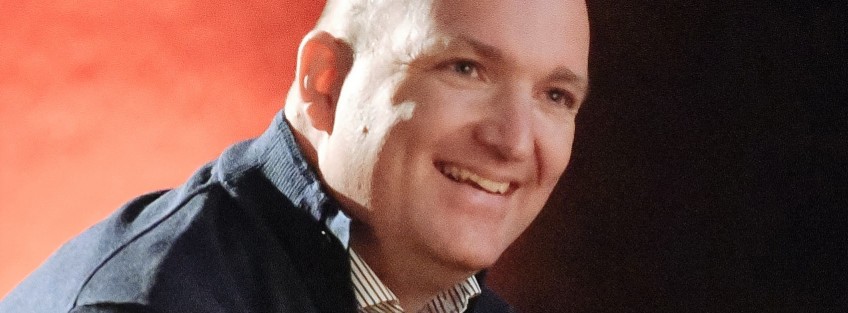An interview with Gerke Witteveen
Mon | 01.05.2017
Other
1. Dear Gerke, welcome to the NRCC Board of Directors and congratulations for your appointment as President. First of all, please introduce yourself briefly.
I’m Gerke Witteveen, 42 years old. As you can guess from my name, I am a Dutch citizen. I am married with Irina and we have a 3 years old son together.
Currently, I am working as CFO for NN Asigurari de Viata in Bucharest, having joined the company in November 2016. My professional background for the past 11 years is in the insurance industry, mostly spent with the Dutch insurance company Achmea. From 2008 until 2013, I was also based in Romania, as CFO for Achmea’s subsidiary Interamerican/Eureko.
Before entering the insurance industry, I started my career as a management consultant, after graduating my master in Business Economics at the Vrije Universiteit in Amsterdam.
2. Moving now forward, please tell us how did you find out about the NRCC and what triggered you to join its Board?
I have known about the NRCC for quite some years, having lived and worked in Romania before. In that period, I joined some of the events organized by the NRCC.
After coming back in November 2016, I went to the networking drinks in Bucharest to meet some old acquantainces. Naturally, there were also a lot of new people I did not meet before.
I was impressed to find out how much the NRCC had grown in the intermediate years and to hear more about the events and activities the NRCC was organizing. This triggered my interest to become part of the Board and help develop the NRCC further.
3. 2016 was an important year for the NRCC, an year focused on expansion, member engagement and high quality deliverables. What are your plans and main directions for a stronger growth of NRCC in 2017?
The growth of the NRCC membership in the past years has created a formidable platform. This can be seen in the number and the quality of events that the NRCC organizes, the development of its activities in Cluj, Brasov and Constanta, and the formation of the member driven Task Forces.
In 2017, we are set to build on this platform. The feedback we receive from our members is a high appreciation of our knowledge events and the useful contacts these and other events provide them. So, this is definitely something we will continue to do, always looking for current topics that are of interest to our members. Wherever possible, we are open to organising events bilaterally with other chambers and business associations, extending the networking opportunities further.
The Task Forces for Transport, Agriculture and IT&C are another great way to bring our members together. All of these sectors are well-represented among our membership and these working groups allow the NRCC to support the common interests of these industries. But just as importantly, the Task Forces also initiate concrete projects.
Next to the sectors represented by Task Forces, it is also good to mention that NRCC supports the interest of its members in the 13 working groups of the Coalition for Romania’s Development (CDR).
Last year, the 5th edition of NRCC’s Nearshoring guide was published: a practical toll, based on the input and expertise of the members. This year we plan to develop to more dedicated publications for SMEs and Start-Ups, both linked with two major events planned in Bucharest this fall.
Another objective for the 2017 is to strengthen the link with the Netherlands as NRCC intends to be a platform for trade between the two countries. Through our sister organisation the DRN (Dutch Romanian Network) we have a reach in the Netherlands which helps our members who wish to land their feet in the Dutch markets or seek partners.
Last, but certainly not least, I’d like to mention our aim to continue developing our activities outside Bucharest, sharing knowledge with local business communities in other regions. We provide a platform - NRCC UNIVERSITY- where our members present their expertise and where local businesses can meet the NRCC. Also, we look to develop our local community development programe, where NRCC engages with local authorities and discusses potential economical growth in communities, providing the perfect set-up where our members with knowledge can interact on key-topics required by local stakeholders.
4. Talking a bit more about the trade with the Netherlands. What is the level of Dutch investments in Romania and what is investors’ sentiment like in your opinion?
The fact that the Netherlands is the biggest foreign direct investor in Romania is well publicized. Obviously, this is a relevant measurement of the level of Dutch investments in Romania, mostly driven by a number of large corporations. However, to me that is only part of the story.
Equally relevant is the huge number of smaller Dutch companies and individual entrepreneurs who are active in Romania. Currently, there are more than 1.000 companies active in Romania which have Dutch roots. This is a strong testament to the economic ties between the two countries.
Romania continues to be an attractive country to do business for many investors, irrespective of their size. In 2016, it was the fastest growing economy within the EU and this potential for growth remains a great pull factor for potential investors. Furthermore, Romania’s geographical position and the availability of skilled labor makes the country specifically attractive for sectors that are traditionally strong in the Netherlands, like transportation, agriculture and technology.
5. What is the main lesson that Romania could learn from the Netherlands from a business point of view? Is there a vice versa situation?
I am not sure I would speak of ’lessons to be learnt’, but there are for sure cultural traits that are distinct for Dutch and Romanian people and business. And it is certainly worthwhile to appreciate the qualities each represents and, at times, to emulate them.
At the risk of stereotyping a bit, I would say that Dutch business culture and Dutch people generally plan ahead and take a long-term view. They have a very structured approach to problems that arise. It is very much about separating the main items from the (less relevant) details and focussing on what is truly important. On the other hand, Romanians – both as people and as companies – are generally great at adapting, reacting to fast-changing circumstances and finding a way to get things done.
I believe both cultures can at times benefit from borrowing from the other. Balancing, or rather combining, the structure of the Dutch with the flexibility of the Romanians, is surely a recipe for success.
6. What do you like most about Romania?
There are many things to mention here: travelling around the country to discover the diversity of landscapes and regional cultures, the hospitality I have enjoyed in many places, the climate with real summers, springs and winters (unlike the Netherlands) and so on.
If I try to summarize it in one sentence, I’d say that Romania never seizes to surprise and excite me. It continues to provide me with new discoveries every week.
7. Last but not least: do you have a special message for NRCC members?
As the Board and executive team of the NRCC, we represent you, our members. And that is certainly also true for me as the President of the Board. I look forward to meeting most of you during the various events that will take place in the coming years. I would like to hear your feedback and ideas to make the NRCC even more effective, to remain a vibrant and strong business community and to provide continued support for the success of our members’ business endeavours.
2025
-
November (1)
-
October (1)
-
September (1)
-
July (1)
-
June (1)
-
April (1)
-
February (2)
-
January (1)
2024
-
November (1)
-
October (1)
-
July (1)
-
May (1)
-
March (1)
-
February (1)
-
January (1)
2023
-
November (1)
-
September (2)
-
August (2)
-
June (1)
-
May (1)
-
April (2)
-
March (1)
-
February (2)
-
January (2)
2022
-
December (3)
-
November (4)
-
October (3)
-
September (4)
-
August (3)
-
July (6)
-
June (4)
-
May (4)
-
April (8)
- Marketing News by diARK - April 2022
- Finance News by Mazars Romania - April 2022
- Experience the Perfect Chauffeur Transfer with David Intercar
- Mobility News by Business Lease - April 2022
- NRCC MEMBER IN SPOTLIGHT, WOLTERS KLUWER
- Crowe Romania and DeclaratiaUnica.ro engage in the automation of the single return form and the offering of personalized consultancy
- Cryptocurrency News by Bitcoin Romania, April 2022
- Legal News by BBW LAW - April 2022
-
March (6)
-
February (4)
-
January (5)
2021
-
December (3)
-
November (4)
-
October (2)
-
September (2)
-
August (1)
-
July (5)
-
June (3)
-
May (5)
-
April (4)
-
March (7)
- Cryptocurrency News by Bitcoin Romania, April 2021
- HR News by CNA International Executive Search Romania, March
- Real Estate News by CTP Invest, March 2021
- Sale-Purchase of Agricultural Land Located Outside Build-Up Areas
- MEET THE NRCC BOARD CANDIDATES 2021
- Fleet Management – Complete Makeover or Small Adjustments?
- Cryptocurrency News by Bitcoin Romania, March 2021
-
February (5)
-
January (6)
2020
-
December (2)
-
October (2)
-
September (3)
-
August (2)
-
July (6)
- NRCC Member in Spotlight Interview - Autonom
- Insolvency Proceedings: New Rules
- Member in Spotlight, UniCredit Bank
- Financing opportunities overview for large enterprises, SMEs and other organizations
- Companies: Simplification of Formalities
- Call for Leaders | What is your readiness score to benefit from the EU SURE initiative?
-
June (5)
-
May (8)
- The State of Alert. New rules for the collective proceedings
- The Retail Industry
- EU grants up to 6 Mil Euro for SME-s investment projects
- Member in spotlight, Heisterkamp Transportation Solutions
- State of Alert...What Is New
- The forced transformation of the automotive industry – Mazars analysis
- State of Alert in Romania
- Reducing the Impact of the Pandemic
-
April (6)
-
March (2)
2019
-
November (2)
-
July (1)
-
June (1)
-
March (2)
-
January (1)
2018
-
October (2)
-
September (1)
-
August (1)
-
July (3)
-
June (2)
-
May (1)
-
April (1)
-
March (3)
-
February (13)
- NRCC Elections 2018 - Elena Badea
- NRCC Elections 2018 - Loreda Dragomir
- NRCC Elections 2018 - Simina Fodor
- NRCC Elections 2018 - Manuel Herraiz Orti
- NRCC Elections 2018 - Tom Leene
- NRCC Elections 2018 - Mircea Moga
- NRCC Elections 2018 - Ronald Oort
- NRCC Elections 2018 - Razvan Pascu
- NRCC Elections 2018 - Alexandru Popescu
- NRCC Elections 2018 - Mihaela Tudor
- NRCC Elections 2018 - Loredana Van de Waart
- NRCC Elections 2018 - Edwin Warmerdam
- NRCC Elections 2018 - Philip Aarsman
2017
-
November (1)
-
September (1)
-
August (2)
-
May (1)
-
April (2)
-
March (1)
2016
-
November (1)
-
September (8)
-
June (1)
-
February (2)








